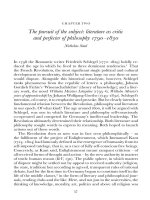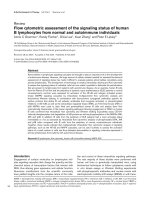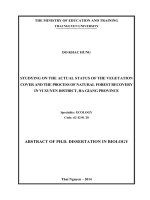Status of the CLIC DR wiggler design and production at BINP
Bạn đang xem bản rút gọn của tài liệu. Xem và tải ngay bản đầy đủ của tài liệu tại đây (1.58 MB, 21 trang )
Status of the CLIC DR wiggler
design and production at BINP
A.Bragin, E.Levichev, P.Vobly and
S.Zaitsev
Budker Institute of Nuclear Physics, Novosibirsk
April 25, 2008
Outline
•
•
•
•
•
Wiggler parameter selection
Magnetic and mechanical design
Quench protection system
Wiggler production status
Wiggler production schedule
CLIC DR emittance requirements
PM emittance
CLIC DR normalized emittance
as a function of the wiggler period
and the field amplitude
(by M.Korostelev, IBS included)
PM
SC (NbTi)
Period length
cm
10
5
Aperture (beam)
mm
12
12
Peak field
T
1.7
2.5
W. length
m
2
2
Temperature
K
Room
4.2 K
SC emittance
Wiggler parameters selection I
For a sine-like wiggler model:
w
0
8I
32/ 5
min 3Lw
x 2w
3
10 I 5
2/5
hw min
I5
10 3
Lw w 2w
1/ 5
I5
2
Lw w w
Emittance minimization requires a shorter period length and, at
the same time, a higher magnetic field amplitude.
This is a contradictory requirement!
1/ 5
Wiggler parameters selection II
The field amplitude depends on the wiggler gap and period length as:
Bw ~ exp g / w
Gap field amplitude and period emittance
The gap usually is defined by external conditions (SR passing)
PM technology vs. SC technology
4-m-long PM damping wiggler for
the PETRA III project
Facility
Year
Bm(T)
SC wiggler for the Diamond LS
g(mm
)
L (mm)
Ay(mm)
50
500
12-14
(m
m)
SC
CLIC DR
(short)
200
8
2.5
20
SC
CLS (Canada)
200
5
2.0
13.5
34
1120
9.5
DLS (UK)
200
6
3.5
16.4
60
1544
10
CLS-2
(Canada)
200
7
4.0
14
48
1000
9.5
Main principles
Short period and high field amplitude
Simple technology and easy production
Easy in tuning
Reliable (all coils are wound by a single wire
min of contacts)
Magnetic forces are directed in the iron yoke
no fixing mechanical band is needed
Special quench protection system is proposed
Schematic view and main parameters
SC coils
Iron beam-yoke
Period length
Vertical pole gap
Beam aperture
Peak field
Prototype length
Stored energy
5.0 cm
2 cm
1.2-1.4 cm
2.5 T
50 cm
57 kJ
Magnetic design I
Magnetic flux
Air – blue
Iron – green
Coil - red
Half period
y
z
End part
0
Magnetic design II
Field amplitude in the wiggler parts (3D)
BINP Mermaid Magnetic code
Units at the plots – kG and cm
Longitudinal cross
Transverse cross/coil
Transverse cross/between coils
3-4 T
7T
5-6 T
1
Magnetic design III
Field distribution (3D)
Longitudinal in central pole
Transverse
dB/B = ±3.5x10-4
at X = ±1 cm
Longitudinal in the end part
2
Mechanical design I
General view
Regular coil
Iron yoke
End coils to compensate the first
and the second integral
Corrector coils with
individual PS
3
Mechanical design II
Yoke regular part
4
Mechanical design III
Magnetic forces in the
regular coil
SC wire contacts
Iron yoke
End coils to compensate the first
and the second integral
Corrector coils with
individual PS
5
Superconductor
For many years Bochvar Institute in Moscow produces special NbTi SC wire for
BINP with the following parameters:
Single wire length (0.5 m)
– ~2.0
km
SC packing factor
– 67.5
%
Critical current
for 7 Т – 700 А
for 8 Т – 450 А
Wire diameter
– 0.9 mm
SC strand thickness
– 30 um
In our case the current
density in the SC wire is
1250 A/mm2
Critical current
curve
6
Quench protection system I
A comparator measures the voltage difference between upper and low
coils, which appears in case of quench. If the difference appears, the
heater (stainless steel strip mounded along all the coils) heats the
coils by the capacitor pulse discharge, providing uniform distribution
of the stored energy along the wiggler.
7
Quench protection system II
Voltage distribution
diagrams with and
without the quench
protection system
8
Magnetic measurements
Testing
cryostat
700 A PS
Hall probe array (5 probes
placed horizontally with 10 mm
distance)
9
Status
Wiggler development and design is completed
The wiggler manufacturing drawings passed the
technological department
Parts of the spooling device are manufactured and its
assembling will start in near future
We have all materials including SC wire
We have the testing cryostat, power supplies for the
main coil (700 A) and for the correction coils (2 PSs 10 A)
We have all necessary equipment for magnetic
measurement
The quench protection system is under development now
0
Schedule
17.03.07 – 01.10.07: the wiggler design and starting
the production of the coiler unit to test the winding
technology
01.10.07 – 01.03.08: finalizing of the winding
technology and starting of production of the wiggler
prototype
15.11.07 – Status report including: magnetic field
calculation, winding technology description, drawings of the
wiggler prototype and winding tooling, description of the
quench protection system
01.03.08 – 01.06.08: yoke and tooling production
01.06.08 – 15.07.08: coils production
15.07.08 – 01.08.08: wiggler installation in the
cryostat
01.08.08 – 01.10.08: wiggler test and magnetic
1
Conclusion
The short prototype of the SC wiggler for the CLIC
DR is under production at BINP
Main parameters of the wiggler are: Bmax = 2.5 T
with the period length of 50 mm and the pole gap
of 20 mm
Such a gap allows to have the vertical beam
aperture around 12-14 mm
The vertical beam aperture is defined by SR
beams passing and wake fields, which may heat
the vacuum chamber walls









